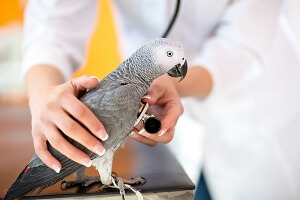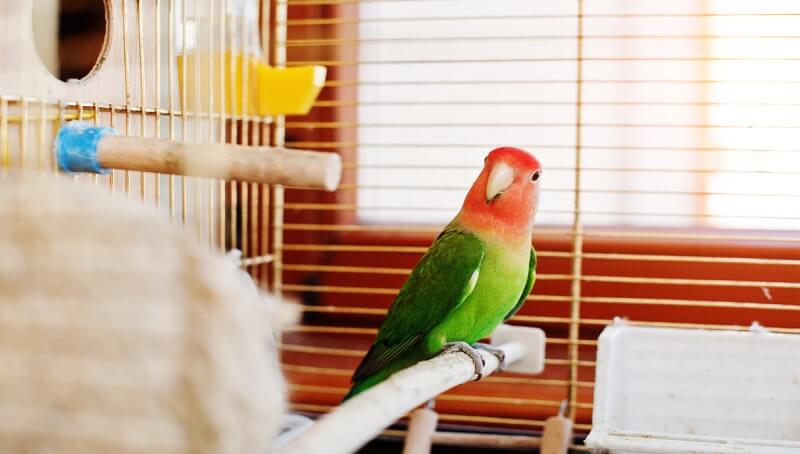Environment and regularly checking their living space for any potential hazards. Here are some key highlights and preventive measures related to heavy metal poisoning in birds:
Key Highlights:
- Common Heavy Metals: The most common heavy metals that cause poisoning in birds are lead, zinc, and iron. These metals can be found in various items around the house and bird cage.
- Symptoms: Symptoms of heavy metal poisoning include trembling, seizures, vision problems, loss of appetite, regurgitation, abnormal defecation, and weight loss. Early diagnosis is crucial for successful treatment.
- Diagnosis: Veterinarians use X-rays and blood tests to diagnose heavy metal poisoning in birds.
- Treatment: Immediate treatment involves stabilization, heat, fluid therapy, and detoxification with chelating agents. Proper treatment can lead to complete recovery.
- Curiosity and Exposure: Parrots are particularly at risk due to their strong beaks and curiosity. They may chew on cages, wires, or other items that contain heavy metals.
Prevention Tips:
- Careful Selection of Cages and Toys: When purchasing cages and toys, ensure they do not contain lead or zinc. Opt for safe materials specifically designed for bird safety.
- Regular Environment Checks: Regularly inspect your bird’s environment for any potential sources of heavy metals. Pay attention to peeling paint, metal objects, and old toys that might contain harmful substances.
- Inform Yourself: Be knowledgeable about the items in your home that could pose a risk. Common household hazards include some types of jewelry, batteries, linoleum pieces, and even certain adhesives.
- Diet and Nutrition: Ensure your bird’s diet is balanced and does not contribute to excessive intake of metals like zinc and iron, which are necessary in small amounts but dangerous in large quantities.
- Veterinary Care: Regular check-ups with a vet can help catch signs of heavy metal poisoning early, improving the chances of successful treatment.
Important Takeaway:
Heavy metal poisoning in birds is a serious but preventable condition. Being proactive in removing hazards, choosing safe cage materials, and regular veterinary care are key to keeping your pet bird safe and healthy.
One of the biggest medical problems a pet bird can have is heavy metal poisoning. Of course, this intoxication is dangerous for any animal and any person, but birds have a special sensitivity to heavy metals. Birds can easily intoxicate themselves with heavy metals found in their environment. Each type of heavy metal causes distinct symptoms and affects pet birds differently. The three heavy metals that usually cause heavy metal poisoning in birds are lead, zinc, and iron.Heavy metal poisoning in birds – very common and very serious
The smallest amount of lead or zinc consumed by a bird can send it directly to the veterinarian or can even be fatal. You probably think that there is no place for the bird to ingest such heavy metals in your home. Where could they find them to ingest them? Plus, you take care of the pet and keep it from ingesting such things, right?
Well, things are not that simple. No one can watch a bird 24 hours a day, 7 days a week. And yes, the bird finds places where it can ingest heavy metals. For example, it can chew the cage bars, cage toys, or other items it finds in the cage. Most of these can contain zinc and lead. Therefore, it is recommended that when buying a cage, you make sure it doesn’t have elements containing lead, zinc, or other heavy metals.
Also, the bird can pinch galvanized wires, glued parts with various adhesives, plastic parts, batteries, pieces of linoleum, pieces of glass, jewelry made of non-precious metals, and many more with its beak. All of these can contain heavy metals. This is how easy it is for your bird to get intoxicated!
You might also like my articles about:
- Can you use bleach to clean animal cages
- How do you know if your pet bird is depressed
- Foods that are toxic to pet birds
Symptoms and types of metal poisoning
Early diagnosis of such poisoning in birds is the key to successful treatment. The symptoms that send you to the emergency veterinarian are:
- trembling from the whole body;
- wings left down the body;
- seizures similar to epileptic ones;
- vision problems or even blindness;
- loss of appetite;
- regurgitation;
- continuous thirst;
- abnormal defecation;
- weight loss.
Zinc and iron are present in food and are needed in small amounts for a healthy bird. But when abnormal amounts are present in the body of the bird, the same heavy metals can lead to poisoning or intoxication.
Lead poisoning is no longer as common as it used to be. Humans have become more aware of the potential danger and are taking precautions not to happen to their birds too.
Poisoning with a heavy metal such as iron can lead to iron storage disease, siderosis, or hemochromatosis, which causes the deposition of nutrients in the internal organs of the body. This can lead to liver problems and affect other organs.
Parrots are more exposed to heavy metal poisoning due to their strong beak and curiosity. The most common type of poisoning is zinc poisoning because it is contained in the galvanized mesh used to make volitions, bird cages, adapters, and feeders.
Heavy metal poisoning first affects the central nervous system and kidneys, presenting as clinical signs: Strain, depression, and ataxia.
However, due to neurological dysfunction of the upper digestive tract, birds will vomit. Mucus can accumulate in the mouth. In an attempt to remove it, the bird will also cover the feathers on its head. Other clinical signs include polyuria, polydipsia, color change, anorexia, and sudden death.
Diagnostics
 If you suspect heavy metal poisoning in your bird, take it to the vet immediately for an examination. Usually, the doctor will perform X-rays, which can identify the type of heavy metal. Blood tests can also determine the presence of heavy metals.
If you suspect heavy metal poisoning in your bird, take it to the vet immediately for an examination. Usually, the doctor will perform X-rays, which can identify the type of heavy metal. Blood tests can also determine the presence of heavy metals.
Treatment
The veterinarian will immediately begin treatment for detoxification without even waiting for laboratory tests. Quick action is essential to save the life of the bird intoxicated with heavy metals.
After the bird recovers from its intoxication, the veterinarian will continue with treatment and animal support food, so that the little patient can fully recover. Fortunately, properly treated intoxication leads to complete healing without leaving any trace. The bird will be out of danger if you take it to the vet early. Cases, where the organs remain damaged and cause the death of the bird, are quite rare.
Treatment consists of:
- Stabilization, heat, fluid therapy;
- treatment of intoxication with chelating products, d-penicillamine for lead poisoning;
- prevention of subsequent exposure by identification and removal of source.
Chelation is an organic compound used to detoxify toxic metal agents and treat this condition. Chelating agents are repeatedly injected into the muscles of the poisoned bird until the blood levels of the bird return to normal. When the condition of the bird stabilizes, the chelating agent can be administered orally at home.
The recovery of the poisoned bird is generally faster in case of mild to moderate poisoning with heavy metals.
Prevention
You can easily avoid heavy metal poisoning by removing any heavy metals that can be ingested from your bird’s environment. That is the cage and the materials used for the restraint. Instead, buy cages and accessories from non-toxic materials such as stainless steel and welded wires.
If your bird is outside the cage, make sure there are no sources of heavy metals available for consumption. Lead can be found in old paint, stained glass, lead curtains, fishing utensils and solders/pastes, and toys. Copper is present in electrical wires.
Therefore, prevention of further exposure should be carried out both at the gastrointestinal level and in the animal environment. Internally, lubricants such as paraffin will be used to remove metals from the ventricle. For the decontamination of the habitat, external, will be identified and removed the source of intoxication.
However, it is necessary to pay close attention to your bird. They are very talented in hiding their symptoms. Therefore, pay attention to any signs and changes, no matter how small. Do not ignore any signals, as the condition of birds with metal intoxication can degrade very quickly.




